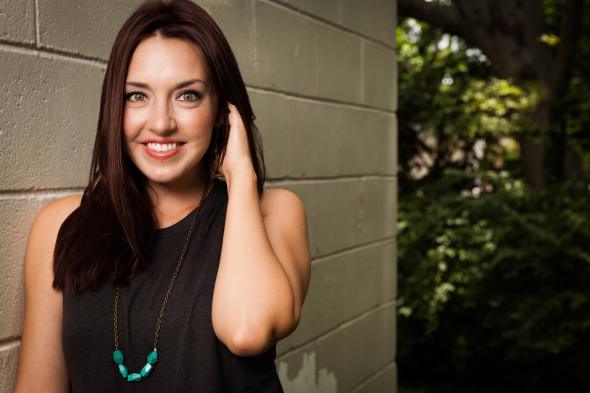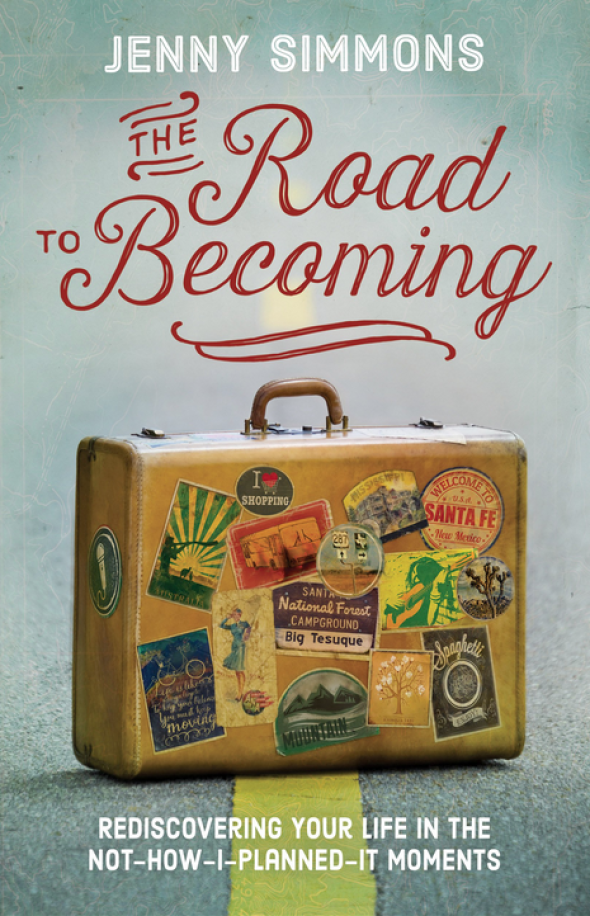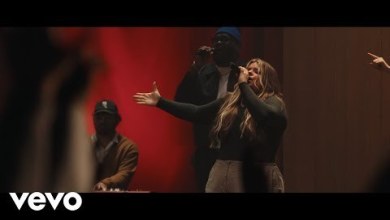In the Spotlight|August 31, 2015 03:29 EDT
Addison Road Singer Jenny Simmons Opens Up About Band Break-up & 'Loss of Plan A' in New Book, 'The Road to Becoming' [INTERVIEW]

Jenny Simmons has been a storyteller from the moment she can remember -- as fans of her band Addison Road will well remember. But during one rollercoaster year, she went from the constantly touring lead singer of a wildly successful Christian band to being a stay-at-home mom with a penchant for modge-podge. In her new book, 'The Road to Becoming', Simmons gives new insight to what led to the band's break-up, in addition to opening up about how her life has changed and how she has dealt with the transition. BREATHEcast had the opportunity to ask Jenny Simmons some questions about the process of getting over the band and writing the book.
'The Road to Becoming' hits shelves on September 1 and you can read our review here.
BC: Though you've been writing songs that connect with people's hearts for years, this is your first book. How would you say your history as a songwriter informed your writing process, if it did at all? Beyond the obvious "it took a lot longer," how was writing something like this book a different experience than, say, writing one of your songs?
As a songwriter your goal is to lead someone through a cohesive thought or story in less than four minutes- and the more broad the audience, the better. If an 80-year-old and an 8-year-old can both somehow relate to the words and/or music you might have actually created something universally relevant and significant. To write those types of songs has often required (of me) writing a bunch of really bad songs first! Many times my music publisher would encourage me to write my "diary entry" songs, get them off my chest, and then basically throw them away. He would then encourage me to take the main idea of those "diary entry" songs and try crafting a song that would speak those same truths to a broader audience. It's the difference between writing solely for yourself and writing for someone else. As I sat down to write the book, I carried this principle with me. In the beginning I wrote chapters purely for my own sake, often as a form of therapeutic processing, and then I would destroy them. Then I would take their main ideas and re-write chapters that were more broad, accessible and welcoming for my very diverse audience. Writing over 200 songs for Addison Road and solo albums that never saw the light of day prepared me to not take my own words too seriously and know when I was writing for me and when I was writing for others.
BC: 'The Road to Becoming' reveals some really painful moments and experiences that you had through the past five years or so. Was there anything in particular that you were hesitant to share? What was the hardest thing to write about?
I think initially as I wrote, I felt an overwhelming sense of loss and failure. It wasn't so much one particular story, but the collective, "Wow, that season really sucked," that was hard to write out. It honestly brought a lot of grief to the surface. Also, in a weird way, I had to work through shame. I think you hear a story like ours and think, "What did those people do wrong?!?" Like Job's friends did in the Bible. I was hesitant to share the blow-by-blow of the actual events, because the more I shared, the more shame's voice crept in and tried to tell me I had done something wrong to cause so many bad things to happen. But this is simply not true and a battle I would not let shame win. No one in their right mind chooses suffering. Still, it was certainly challenging to share our on-going suffering in such a public way.

BC: Addison Road stopped touring and recording music right on the heels of their biggest tour ever, and it seems that it was purely for practical reasons. Your husband and the three other members of the band had to get full-time "real world" office jobs in order to stay financially solvent. The band didn't really implode, it just kind of fell apart and it was clear the journey was at an end. Speaking to that, you were the only member of Addison Road that never actually quit! Can you describe for Addison Road fans what that series of events was like?
My husband was the first to quit and never came back on stage with me. That was January 2011. Ryan and Travis followed next over a matter of months and played their final shows in May of that year. Our drummer, Richard, played his last date around that time as well and then went on the road with Matt Maher. Our songs were strong on radio so show offers kept coming in and I continued to take as many as possible to try and help us financially re-cover. It's a pretty common practice for "bands" to have hired or rotating musicians as long as the lead singer is around. For a time we even considered never letting the band come to an end and just getting new bandmates for me. But it just didn't feel right to me. I needed closure and as a loyalist, didn't love the idea of it not being the original band. It would be another year before we made an official announcement that Addison Road was coming to a final and formal end, simply because I needed the work and wasn't ready to give it up yet.
I distinctly remember one of my first Addison Road shows without my husband and the original members. After a long day of travel, I arrived at the venue and was told by the promoter of the festival that the money hadn't come in like he had prayed it would and he hoped we would still perform, but he couldn't pay me a penny. I knew I had already spent $1700 in plane tickets to get everyone to this West Coast town, another few hundred to pay for hotel rooms, a rental car and then I would owe each one of the hired musicians playing the show with me. I had no idea what to do and all I could think was, "My boys would know what to do." Now I was out with brand new guys and I couldn't even remember all their names and just hoped they knew the music! I set up the merch, did the sound check, then the radio meet and greet and then went back to my hotel room and sobbed. I feel like I did that routine for nearly a year (although the other promoters paid!). I would pass a street in a new town with all the guys' favorite restaurants and cry; I would perform on stage with great people, but they weren't my people. It was a long, hard year for me.

BC: You talk a lot in your book about the loss of 'Plan A' and how when the pursuit of a long-held dream becomes unfeasible, it can feel like a death. Part of the book, "The Burying," focuses on unpacking those feelings of grief and really allowing yourself to sit and process what has happened. At what point would you say your "burying" process became something you were consciously aware that you were doing?
We were really lucky to have a friend (Gregg, who I mention in the book) tell us very honestly that quitting the band would feel like a death. Had he not spoken these words of wisdom to us, we would have been ill-prepared. But because he gave me that framework from the beginning, I was able to remind myself along the way that if the ending of the band was like a death, then my insane emotional state was because I was in a season of grieving. I did not realize as quickly that I was in the other seasons, but I had a clear sense that the burying was on the horizon from the outset. And for that I am grateful; it gave me an immeasurable amount of freedom to do just that.
BC: Though the grieving/loss aspect of losing a dream is painful, you describe the interim period between the death of one dream and the birth of another as even more difficult, calling it "pure torture." Can you elaborate a little bit on why in your story, the waiting was harder than the grieving?
I think about it in terms of going from a major injury to being healthy again. Immediately after a major accident or the onset of an illness you are in a state of shock (the destruction). At a certain point you come to grips with what you have lost or have to endure, and you often do so in the haze and comfort of medicine, doctors, pastors and people that love you surrounding you. This phase seems similar to the seasons of burying and lostness that I describe in the book. To be sure, these seasons are painfully hard, but they are also seasons that we as humans are, to some degree, prepared for. We all know about death and pain and suffering and even have a blueprint for how to walk those seasons. We get chemo, or lie-in-wait in ICU or grieve our dead. But then at a certain point in your journey towards healing you move beyond the initial destruction and past the intense pain of loss and you are ready to be well. You are done being sick (or lost!); your fight and spirit and desire for NEW life comes back. But during the season of waiting, one part hasn't caught up with the other yet. It's like when my grandpa wanted to walk so badly, but his legs were simply not willing and able yet. It was coming- he would be able to walk again- just not yet. He was frustrated and angry and ready. To me, that is the hardest part. When you are ready to live again, walk again, face new beginnings again... but it's just not time. It was, for me, the most counter-intuitive season that required extreme wisdom, patience and discipline. Three things I don't have tons of. I knew I could force new life the way my grandpa could will his body up, whether his legs were ready or not! Problem is, when you jump that gun, your legs buckle and you often fall flat on your face. It took everything in me to practice the patience required during the season of waiting.
BC: It seems like a big part of the story in this book is about how to resolve our relationship with God when it seems like the dream He has given us is not something that will be viable in this world. Questions of financial sustainability and spiritual confusion are a big, big part of this book. Knowing what you know now, what would you say to young musicians trying to financially survive in the Christian music industry?
I would encourage young artists to diversify what they do, namely, to start song-writing with other people as soon and often as possible. The royalties from song writing (to be clear: songs you write for other artists) help many artists financially survive. Don't be above taking other jobs. Is there a way for you to lead worship or work at Starbucks or produce music/play for albums on the side? These are all things to consider. My friend, author Margaret Feinberg says she writes 3% of the time and works 97% of the other time doing all kinds of jobs within the industry to be able to write for herself as well. That is very telling and an incredibly helpful way to enter into the profession.
BC: What would you say you discovered about yourself by writing this memoir? What do you really want readers to take away about who you are and what you've learned?
I want readers to walk away knowing that they are not alone and having a toolbox from which they can pull and say, "OH- wait- I am in a season of ________ and it's ok for me to ________." I think we haven't done the best job as the body of Christ of making space for life's hardest season. Consequently, we have people who love Jesus that are completely unprepared for the seasons of grieving, lostness and waiting. Likewise, we have brothers and sisters who have faced battles for so long that they don't know that the transition into new life doesn't have to look shiny and happily-ever-after. I want the to read this book and know that new life will come and it can be as simple as watching the sun rise and light creeping into small spaces where once there was darkness. Mostly I hope what readers take away is that, regardless of the season we find ourselves in, the intimacy we share with the Savior is enough to make the hardest seasons of life bearable, beautiful even. I want the hope of new life and new seasons to be the last thing on someone's mind as they put the book down; knowing in their own not-how-I-planned it moments their is strength to take the next step and the next.
Preorder 'The Road to Becoming' today here. The book releases September 1.












